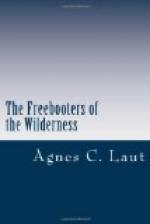He went across to the pack trees. Picking up the cross trees and blankets, he laid them on the ground as a pillow.
“If you will rest here, sir, I’ll go above and have a look.”
From the top of the sand bank, the Ranger looked down to see the old man lying with his face to the sky, his head pillowed on the saddle blankets, sound asleep. He looked across the Desert. The sun had sunk behind the azure strip of the mountain sky line. The billows of lava, black and glazed, the ashy silt pink-tinged to the sun-glow, the heaving orange sands . . . lay palpitating infinite almost with a oneness that was of God. Wayland was not given to prayers. Perhaps, like all men of action, he tried to make his life a prayer. Somehow, something within him prayed wordlessly now . . . not for exceptional advantage in the game of life, not for remission of the laws of Nature, not for miracle, but for aptitude to play the game according to rules. His wordless prayer did not end in an “amen.” It ended in a little hard laugh. As though Right were such a simple business as just personally being good! or an insurance policy against damnation and guarantee for salvation! What was it the old man had said? Your right must be made into might . . . that was the game of life: the saving of the Nation: the good old-fashioned square deal no matter which party cut the cards. Right made Might, Might made Right; that was what the Nation wanted!
Then, it came again, the touch, the consciousness, the will to power, to do, to fight and overcome. He rose and looked across the Desert. A puff of dust, a swirl and eddy of riders, resolved itself through the terra cotta mist to the forms of three men going over the crest of the sand roll against the red sun-wrack of the sky line; three figures far apart, riding slowly, crawling against the face of the distant sky; one man in advance bent over his pummel; a second rider with a pack horse in tow pulling and dragging on the halter rope, the pack horse white and lame, stopping at every step, the man crunched, huddling fore done, down in his saddle; then dragging far to the rear, just cresting the sky line as the other two disappeared, swaying from side to side, a ragged wreck lying almost forward on his horse’s neck; was he being deserted?
Wayland uttered a jubilant low whistle and tumbled down the sand bank to his camp kit.
The wind was at lull and the velvet air palpitating as a human pulse. The after-glow lay on the orange sands cresting all the ridges with cressets of flame. Wayland was riding bare backed.
“When we sight them, I want you to drop back, sir! The Desert’s got them. They haven’t the resistance of dead fish left. If we cut across this sink, as I make it, we’ll save a couple of miles and almost meet them on the other side of the next ridge.”
When Wayland had wakened the old frontiersman, he had babbled inconsequently about the sea. Mixing brandy with the last of the sediment water, Wayland got him into the saddle. There were queer splotches of blood under the skin on the backs of his hands; but when the brandy relieved his fatigue, he stopped babbling of the sea and spoke coherently.




